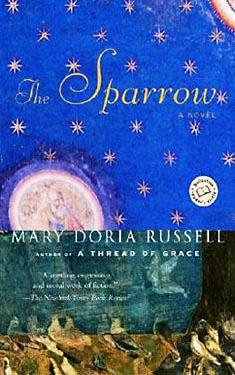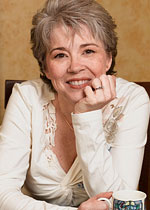WoGF Review: The Sparrow by Mary Doria Russell
 Thom Denholm (Thomcat) works in the software industry and as a baseball umpire. In his spare time, he has kept up a steady stream of reading, fiction and non-fiction, since he was old enough to enter a library “summer reading” contest. He first read “A Wrinkle in Time” before it was extended into a series, only coming back to read the subsequent books recently. He joined WWEnd last year, too late to really dive into the GMRC but signed up for the WoGF challenge immediately, and he’s looking forward to a functioning “random author picker”. : )
Thom Denholm (Thomcat) works in the software industry and as a baseball umpire. In his spare time, he has kept up a steady stream of reading, fiction and non-fiction, since he was old enough to enter a library “summer reading” contest. He first read “A Wrinkle in Time” before it was extended into a series, only coming back to read the subsequent books recently. He joined WWEnd last year, too late to really dive into the GMRC but signed up for the WoGF challenge immediately, and he’s looking forward to a functioning “random author picker”. : )
 Mary Doria Russell‘s The Sparrow is an award winning book, a story of first contact. It is told in two intermingled narratives – one leading up to the contact and one after the fact, a questioning of the sole survivor. While portions were though provoking, I find this book less than it should be.
Mary Doria Russell‘s The Sparrow is an award winning book, a story of first contact. It is told in two intermingled narratives – one leading up to the contact and one after the fact, a questioning of the sole survivor. While portions were though provoking, I find this book less than it should be.
I enjoyed reading about most of the personalities in the early part of the story, although many were more caricature than character. While reading these sections, my thoughts kept drifting to their eventual deaths, which was distracting. As a team, they were a little too conveniently matched, but then this is fiction after all.
The other sections of the book, dealing with the aftermath, were used to either to lead the next portion of the early story or to delve deeper into the main character’s crisis of faith. This last part culminates at the end of the book in a too-neat wrap up. In the final chapter, the poise regained by the main character had me believing he had been faking earlier, which was probably not the author’s intention.
This story doesn’t fit into the category of Hard Science Fiction by any means. Most of the radio traffic and space travel is close to believable, but from that point forward it becomes less so. An oxygen atmosphere, bipedal humanoids, edible foods – it either strains credibility, or truly is Deus Vult (God wills it).
 The latter phrase is used often by the main characters, and throughout the book this is in question. The title of the book refers to the fact that not even a sparrow falls without God knowing of it. Presumably the main character is representative of that sparrow, whose story we follow through both portions of the book. Up until the last chapter, I too wanted to follow this character, even though his path was very dark towards the end.
The latter phrase is used often by the main characters, and throughout the book this is in question. The title of the book refers to the fact that not even a sparrow falls without God knowing of it. Presumably the main character is representative of that sparrow, whose story we follow through both portions of the book. Up until the last chapter, I too wanted to follow this character, even though his path was very dark towards the end.
The most thought-provoking section was where the main character discussed the actions of the aliens, reflecting on the actions taken by many other cultures and the stories created to justify them. This and how it plays into a first contact situation was very interesting to me, and I will probably read the sequel to see how it all comes out.



















 Full Details
Full Details


1 Comment
I read this book when it came out so my memory is fuzzy but I really liked it. I think it’s worth mentioning a critical aspect of the novel’s subject matter: the role of the Catholic Church in the first contact. Russell has a solid grasp of the Church’s history of involvement in colonial Latin America in the 15th and 16th centuries (I was studying colonial Latin American history in graduate school when The Sparrow came out) and her exploration of the Church’s response to the discovery of extraterrestrial intelligence is informed by this earlier historical precedent. It makes sense that the Church would immediately have to grapple with the theological implications of extraterrestrial intelligence but this issue rarely comes up in first-contact science fiction. While other aspects of the novel may be weaker, I found her exploration of how the Catholic Church would deal with first contact to be really interesting and effective. (There was even some speculation when the book came out that it had been ghost written by a Jesuit.) The sequel is good, too.
Sorry, the comment form is closed at this time.